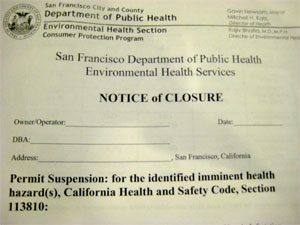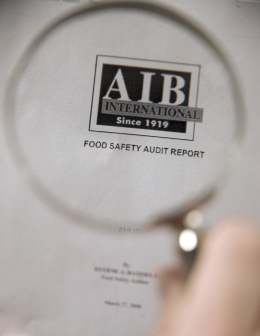The same third-party auditor that approved salmonella-tainted peanut paste that killed nine and sickened 600 also gave DeCoster egg operations a “superior” rating and “recognition of achievement” in June  2010, just as thousands of Americans began barfing from salmonella in DeCoster eggs.
2010, just as thousands of Americans began barfing from salmonella in DeCoster eggs.
Beyond the theatre of yesterday’s House hearing about the salmonella-in-eggs outbreak that has sickened well over 1,600 was the revelation that DeCoster’s Iowa egg operations had been audited by the American Institute of Baking based in Manhattan (Kansas).
The N.Y. Times reports that documents released by the committee showed that Wright County Egg achieved a “superior” rating and “recognition of achievement” from AIB International, a private inspection company based in Manhattan, Kan., after a June inspection of its processing facility. That came just as the company was causing thousands of illnesses from contaminated eggs.
In 2008, AIB gave a “superior” rating to a Peanut Corporation of America plant in Blakely, Ga., that was later found to be riddled with salmonella that caused a nationwide outbreak and the largest food recall in American history. A spokesman for AIB could not be reached.
Elizabeth Weise of USA Today reported today that Wright County Egg, one of the Iowa farms at the center of this summer’s recall of 550 million eggs, earned "superior" ratings for its facilities from a third-party auditor the past three years.
But the auditor was the same one that gave a superior rating to the Peanut Corp. of America, whose shipments were linked to a salmonella outbreak that sickened hundreds a few years ago.
AIB International, of Manhattan, Kan., audited Wright’s egg-packing plant twice in 2008, four times in 2009 and at least once in 2010, and every time found it to be "superior," Rep. Diana DeGette, D-Colo., said during the hearing. … Calls to AIB were not returned Wednesday.
AIB International also gave the Peanut Corp. of America’s Plainview, Texas, plant a "superior" rating. An outbreak of salmonella linked to some  peanut products shipped from that plant and another PCA plant in 2007 and 2008 sickened as many as 600 people and may have contributed to nine deaths.
peanut products shipped from that plant and another PCA plant in 2007 and 2008 sickened as many as 600 people and may have contributed to nine deaths.
This is beyond embarrassing. It’s criminal.
A Kansas State student wrote in 2009 that after a March 6, 2009 article in the N.Y. Times sorta shattered the myth of third-party food safety audits, he couldn’t get anyone at AIB to talk.
Since the release of the Times article, AIB now requires a minimum of two days or longer to complete an inspection at a food processing facility. AIB has also announced it will change the name of its Good Manufacturing Practices inspection certificates from “Certificate of Achievement” to “Recognition of Achievement.”
Is that like Homer Simpson winning the First Annual Montgomery Burns Award for Outstanding Achievement in the Field of Excellence?
Apparently, the answer is yes, given the salmonella-in-eggs poopfest.
Third-party food audits, like restaurant inspection, are a snapshot in time. Given the international sourcing of ingredients, audits are a requirement, but so is internal food safety intelligence to make sense of audits that are useful and audits that are chicken poop.
The third-party food safety audit scheme that processors and retailers insisted upon is no better than a financial Ponzi scheme. The vast number of facilities and suppliers means audits are required, but people have been replaced by paper.
Audits, inspections, training and systems are no substitute for developing a strong food safety culture, farm-to-fork, and marketing food safety directly to consumers rather than the local/natural/organic hucksterism is a way to further reinforce the food safety culture.
After the salmonella-in-peanut paste crap, Costco, a retail store, which previously limited AIB’s inspections to its bakery vendors, has now instructed suppliers to not use AIB at all.
“The American Institute of Baking is bakery experts,” said R. Craig Wilson, the top safety official at Costco. “But you stick them in a peanut butter plant or in a beef plant, they are stuffed.”
Or as Mansour Samadpour of Seattle said at the time,
“The contributions of third-party audits to food safety is the same as the contribution of mail-order diploma mills to education.”
Who were the buyers of DeCoster eggs who used AIB audits to justify putting salmonella on grocery store shelves? Any retailers want to step forward?
Coincidentally, Enreco Inc., a maker of flaxseed flours, bragged in a press release yesterday they had earned a “superior" rating from a recent AIB inspection at its Wisconsin production facility.
Enreco president Sean Moriarty said, “We are absolutely pleased to have achieved AIB’s highest rating for four consecutive years now, even while incidents of food product recalls in the last two years have caused AIB to toughen their inspections considerably."
Sean, you may want to rethink that PR.

.jpg) That’s what I told a student reporter for the
That’s what I told a student reporter for the .jpg) I told Tyler, the reporter,
I told Tyler, the reporter,
 In 2007, Keystone Foods, the Pennsylvania plant that makes Veggie Booty, received an “excellent” rating from the American Institute of Baking. But the audit did not extend to ingredient suppliers, including a New Jersey company whose imported spices from China were tainted with salmonella.
In 2007, Keystone Foods, the Pennsylvania plant that makes Veggie Booty, received an “excellent” rating from the American Institute of Baking. But the audit did not extend to ingredient suppliers, including a New Jersey company whose imported spices from China were tainted with salmonella. Of all the holiday feasts our family has each year, Christmas is my absolute favorite. Sure the turkey and stuffing are wonderful during Thanksgiving, but nothing can beat the wonderful sweets that are available during Christmas season. Chocolate-dipped pretzels, sugar cookies with icing and sprinkles, peppermint bark, homemade fudge… Chocolate chip cookies are a staple at our house during the holidays. We keep some around in case of a chocolate emergency (Quick! I need a cookie!), or if my Uncle Scott and his family come over. Uncle Scott loves my Mom’s cookies; they taste terrific and are guaranteed to be nut-free.
Of all the holiday feasts our family has each year, Christmas is my absolute favorite. Sure the turkey and stuffing are wonderful during Thanksgiving, but nothing can beat the wonderful sweets that are available during Christmas season. Chocolate-dipped pretzels, sugar cookies with icing and sprinkles, peppermint bark, homemade fudge… Chocolate chip cookies are a staple at our house during the holidays. We keep some around in case of a chocolate emergency (Quick! I need a cookie!), or if my Uncle Scott and his family come over. Uncle Scott loves my Mom’s cookies; they taste terrific and are guaranteed to be nut-free..jpg) The most common foods to cause allergies in adults are shrimp, lobster, crab, and other shellfish; walnuts and other tree nuts; fish; and eggs. In children, eggs, milk, peanuts, soy and wheat are the main culprits. Children typically outgrow their allergies to milk, egg, soy and wheat, while allergies to peanuts, tree nuts, fish and shrimp
The most common foods to cause allergies in adults are shrimp, lobster, crab, and other shellfish; walnuts and other tree nuts; fish; and eggs. In children, eggs, milk, peanuts, soy and wheat are the main culprits. Children typically outgrow their allergies to milk, egg, soy and wheat, while allergies to peanuts, tree nuts, fish and shrimp 